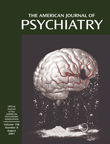To the Editor: We appreciate the comments by Dr. Faedda and colleagues suggesting that rapid lithium discontinuation may uncover latent bipolar disorder in patients unresponsive to antidepressant treatment and that these patients may represent a separate group with a disproportionately high risk of bipolarity. Such interpretation, however, should be made with some caution.
Dr. Faedda et al. base their interpretation on two points. First, the rate of switching to mania in our study seemed higher than that found by Akiskal et al. (1995). However, the number of subjects in our placebo group (N=15) was too small to estimate reliably a switching rate, and it is difficult to directly contrast findings from the 11-year, long-term study by Akiskal et al. with findings from our short-term study of acute and continuation treatment. Second, Dr. Faedda et al. feel that the increased risk of rapid recurrence, particular of mania, after lithium discontinuation played a role in our results. This is possible; nevertheless, what may be more important is that each subject was taking antidepressants—mostly tricyclics—throughout our study, including the period after lithium discontinuation. A switching rate of 13.3% in patients taking antidepressants does not seem unusually high. There have been numerous reports that, on average, tricyclic antidepressants induce switching in 9% of the patients treated for depression
(1) and, in some studies, even up to 25%
(2). With respect to the suggestion that unipolar patients who are unresponsive to antidepressants may represent a particular group with a disproportionately high risk of switching, we are not aware of any report in the literature to support this supposition.
The possible effect of lithium discontinuation is more difficult to evaluate. The risk of rapid recurrence after lithium discontinuation is controversial
(3) and may depend on patient selection. In addition, the studies reporting an increased risk are all long term, generally extending for years
(4), and the observation may not be applicable to our study, in which subjects were treated with lithium for only 8–10 weeks.
We agree that it is wise in practice to look for indications of bipolarity in individual subjects and in the family histories of patients who receive lithium augmentation and to taper lithium gradually
(5). Finally, we agree that the two unipolar subjects who switched to mania after lithium augmentation and discontinuation during the double-blind phase of our study, in fact, suffered from a pseudounipolar illness (bipolar disorder with a unipolar course). Of these two patients, one had already experienced three depressive episodes before the index episode, and the other had a family history of major depressive disorder. This observation would be in agreement with the finding of Angst et al.
(6), who reported that patients with three or more unipolar depressive episodes are especially prone to a diagnostic change from unipolar to bipolar disorder.

